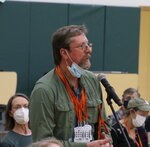




When Manchester took up the business of six articles at a Special Town Meeting at the ME Regional High School last fall, 228 residents checked in, received a handheld electronic voting device and, for COVID safety, settled into seats in either the auditorium or the gymnasium to participate in an old and valued local tradition of debate, consideration, and voting.
Simultaneously managing a Town Meeting between two rooms brought new complexity to commenting and managing votes, which was no wonder. A video link between the rooms didn’t work, but the audio link did. Residents, board members, or Town Moderator Alan Wilson could easily be heard.
Wilson began, and, as he always does, by offering a sample question (“Will the Red Sox make it to the World Series this year?”) designed to demonstrate use of the handheld devices, and confirm that the system is working. Gadgets that weren’t working could be swapped out.
The first article passed 91 to 60; the second 118-30; then 136-6, 141-1, 126-14, 122-16, and finally, 115-4. No close calls. Business was pretty quick and pretty easy.
But in the final tally, an unusual pattern emerged. For each of the seven votes, a significant percentage of voters—34% at best and 48% at worst—either did not vote at all or didn’t have their votes counted. That translates to an average of 88 of the total 228 voters registered that day.
That’s a big deviation from Town Meeting behavior, where voters show up with a mission to vote. Maybe not for all articles—especially if voters are single issue-driven, like supporting school budgets or stopping a project.
But to have a consistent, across-the-board, significant lag in tallied votes is a notable anomaly.
“To my knowledge, this is the only time this has happened,” said Rebecca Townsend, president of the Massachusetts Moderators Association and Town Moderator in Longmeadow, Mass.
Wilson said he and the team supporting Town Meeting noticed “a discrepancy” directly following Town Meeting. They checked the technology (laptops and devices). Everything was operable. Wilson said Town Counsel advised that since the meeting was dissolved, the results were final.
“We did not count abstentions. We did not count any voters who may have come in later or left early. We tested all the equipment with the company,” said Town Clerk Dianne K. Bucco. “We cannot explain any discrepancy in numbers.”
Luckily, the anomaly at Manchester’s fall Town Meeting didn’t have a material impact. Even the worst-performing article vote, where 48 percent of attendees either demurred or cast an unrecognized vote, it would not have flipped the outcome if things were different.
As a result, in this time before the Annual Town Meeting later this month, it’s an opportune time to look, and learn.
It’s a puzzling “mystery,” according to Wilson, a stubborn one that remains unclear six months later, as Manchester readies for its Annual Town Meeting on April 25.
This week he shared a series of steps to protect future meetings from surprises. He will test the handsets before the meeting and open with two test questions for voters, not just one.
Also, for the first time, Wilson will have volunteers track late arrivals and early departures and communicate that change to the Town Clerk, who will update Wilson.
In turn, after every vote, Wilson will compare the number of votes cast against the number of voters present. If there is a shortfall of more than 10 percent on any vote, ask all voters to activate their handsets and compare that result with the number of voters checked in. If the number is the same or very close, proceed with electronic voting. If not, we will use voter cards.
About five years ago, there was something of a trend among Massachusetts municipalities to move to electronic voting systems for Town Meetings. They’re popular with voters and moderators alike because they make Town Meeting more efficient (especially when compared to manual counting of raised voting cards).
Electronic voting also allows votes to remain private, and that’s appealing when voters would rather keep their voting preferences away from prying eyes. But with added convenience and privacy comes a potential lack of visibility on voting.
Upton, Manchester, Natick, Rockport were among those that took the plunge, with Manchester and Rockport adopting the same technology (TurningPoint Technology) in 2019.
Rockport Town Moderator Bob Visnick said the TurningPoint controller system has been “flawless.” The only issue, he found, is remembering to wait 30 seconds to make sure all the controllers have reported back to the central tabulation system.
“It can take up to 10 or 15 seconds to capture it,” said Visnick, so the 30 seconds provide assurance for him that everyone’s vote has been captured by the system. Also, Rockport projects the text of each article on two large-scale projectors. If the article is amended on town meeting floor, the edited article goes up too. Then, he said, after each vote is taken, the count is also posted for all to see, and the town clerk reconciles that tabulation to the total of voters who registered at the door.
“That way if there’s a discrepancy, we can see it and, if necessary, take another count or a card vote,” said Visnik.
When it comes to managing elections, it is Mass. Sec. of State Bill Galvin’s office that has control. And that includes regulating and monitoring any technology that tabulates votes. But that doesn’t include technology used at Town Meetings. For that, towns self-manage.
“Optical tabulators have strict requirements. They must be certified at the federal and state level, with in-office demos and field tests to certify them for logic and accuracy,” said a spokesperson at the Secretary of State’s office. “Devices used at Town Meetings have no such requirements. Town Meetings are the purview of the town moderator and the town boards, or by town bylaw.”
Town Meeting process is, of course, a cherished form of direct democratic rule used principally in New England since the 17th Century. It’s about the community coming together to legislate, openly and through debate. But it’s also about modernizing, safely. After all, back in the day, only white men who owned property could vote at Town Meeting. Now there is electronic voting, which will prompt adjustments.
Rebecca Townsend said it’s vital to understand that even when there are wrinkles or unexpected challenges, the most important thing is to have contingencies in place that offer a guardrail. Another thing is sharing the experience when something unusual, like Manchester’s voter “mystery,” happens.
“It’s worth sharing so we can work to ensure that it is unique,” she said.